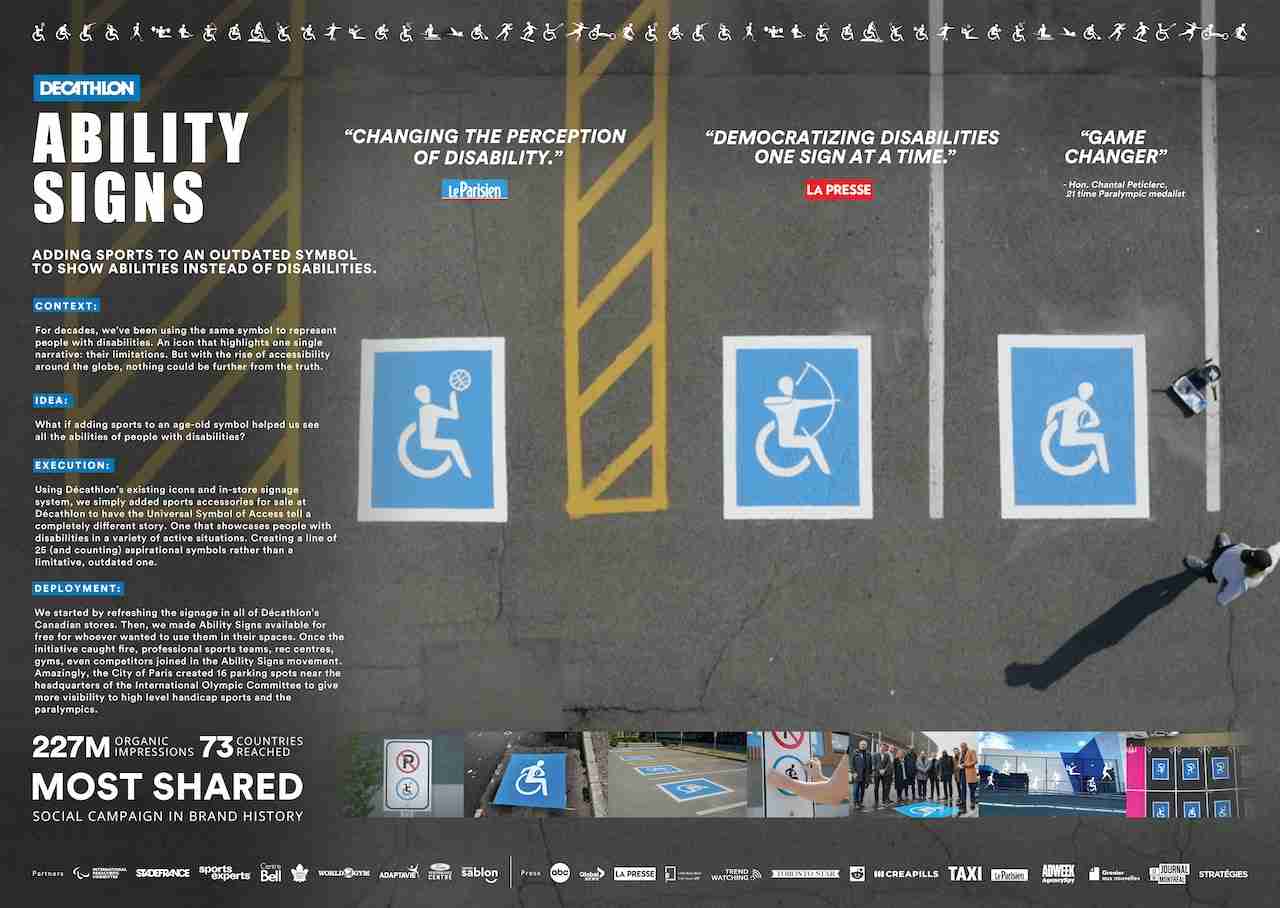Sports retailer Decathlon firmly believes that sport is for everyone and to push this philosophy even further, it has worked with Rethink to remove the ultimate barrier to taking part in sport: disability. Together they have painted a very different picture of disabled sportspeople and have also won the Integrated Campaign and Out Of Home awards at the Drum Awards for Social Purpose. Here is the award-winning case study.
Decathlon is the world’s largest sports retailer. And since its creation in 1976, the brand’s vocation has been to make the benefits of sport accessible to all. This proposition is convincing in a category that tends to glorify performance, personal success and the “sweat and blood” of sport. Rather, Decathlon aspires to highlight the pleasure of sport and alleviate the pressure of sporting performance.
Over the years, the brand has built its success through affordable prices, innovative products, passionate employees and experiential stores. However, despite its iconic status internationally, Decathlon has remained a relatively unknown player in North America, where a legion of traditional sports retailers dominate the landscape. As the brand prepared to open its tenth store in Canada in 2021, it wanted to increase its notoriety locally while making its commitment to the democratization of sport known and renowned among all.
The challenge: emerging from a crowded space, but with a fraction of the share of voice in the category, while avoiding media-intensive brand campaigns, as Decathlon’s culture/DNA has always favored local initiatives rather than “advertising” ones.
STRATEGY
THE DISABLED REMAIN THE FINAL FRONTIER OF INCLUSIVITY IN SPORT. To truly break through, we needed to find a powerful yet profitable idea that reflected our mission to make sports more accessible, while leveraging organic amplification and PR to outperform our media investments. The initiative was intended to tap into a strong cultural tension regarding the accessibility of sport.
And while Decathlon was building its brand new flagship store in Canada, a topic kept coming up more and more in the local news: limited accessibility around the city for people with disabilities. In 2019, the United Nations launched its new Disability Inclusion Strategy to help improve accessibility standards and performance around the world, and the topic has been thrust into the spotlight over the past few years. last years.
Disability still remains the final frontier of inclusiveness in sport. An overwhelming majority of people with disabilities are not active because most facilities are unsuitable, leagues and organizations are harder to find, and athletes with disabilities don’t have much visibility outside of the Paralympic Games. All this to show that representation matters.
HIGHLIGHTING A NEW UNIVERSAL SYMBOL: HIGHLIGHTING CAPABILITIES BEYOND LIMITS. This highlighted a need directly linked to our brand purpose. We therefore aim to raise awareness among the general public about disability and sport and to position Decathlon as an essential ally in the practice of sport. For everyone.
SIGNS OF ABILITY: USING SPORT TO CHANGE OUR VIEW OF PEOPLE WITH DISABILITIES. To change the way we look at people with disabilities, we reinvented the universal accessibility symbol to highlight what they can do rather than what they can’t do. Using Decathlon’s existing signage system and the brand’s iconic blue color, we developed 25 custom symbols representing a variety of wheelchair and non-wheelchair parasports, such as tennis, volleyball, hockey and shooting with the bow. By simply adding sporting goods and accessories to a universally known icon, we told a completely different story: one that highlights everything people with disabilities can do, not their limitations.
We not only deployed signage in car parks and signage in Decathlon stores, but we also created an entire program around it. We have promoted our symbols and made them freely available to everyone on our website under the Creative Commons license. We have invited all sporting organizations (and even our retail competition) to rally around the initiative: ensuring more empowering representation of people with disabilities, but also ensuring that facilities are well suited for them.
FROM DECATHLON PREMISES TO GLOBAL AMPLIFICATION
Launched in October 2021, the ABILITY SIGNS program initially included the following efforts:
Use of symbols in local Decathlon facilities (signage, parking, etc.) in Canada.
A launch video deployed on the brand’s social platforms (Facebook, Instagram and Twitter).
A website (abilitysigns.ca) explaining the initiative and offering free downloads.
A targeted poster campaign around certain stores to give common meaning to symbol changes.
A suite of Giphy stickers allowing users to virtually change accessibility icons on Instagram.
Integration into the company’s newsletter, which reaches thousands of the brand’s followers.
A press relations awareness campaign aimed at sports and news media, as well as certain influential personalities from the sporting world.
Then, over the following months, we expanded the suite of symbols and continued to deploy them in Decathlon premises around the world, including at the headquarters in France.
RESULTS
GLOBAL REACH TRIGGERING A GLOBAL MOVEMENT The campaign was an instant success, with over 200 million organic online impressions, a 430% increase in brand mentions and over 20,000 icon downloads, becoming the the brand’s most shared social campaign.
In the “real world,” the impact has also exceeded expectations. Ability Signs has enabled Decathlon to create bridges and partner with numerous accessibility associations and dozens of leisure centers and sports halls. The initiative has also been supported by professional sports teams such as Paris St-Germain and the Toronto Maple Leafs.
The City of Montreal co-opted the program for signage in certain parks while the City of Paris used it to create new accessible parking spaces near sports facilities. Surprisingly, the Paris 2024 Paralympic Games announced that they would also use the symbols present at their premises during the event.
This contributed to an increase in brand awareness, sentiment and sales (11% YoY) for Decathlon in Canada.
But even more exciting, the initiative seemed to trigger a movement which continued to gain momentum throughout 2022 and early 2023, while Decathlon and its partners continued to deploy the symbols on numerous markets across the world.

